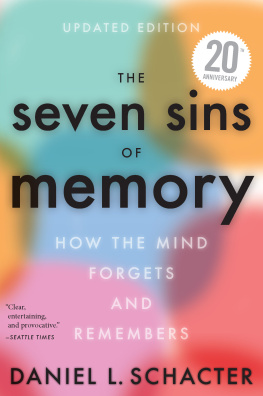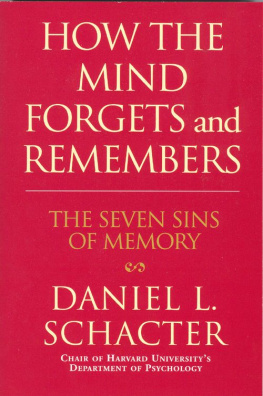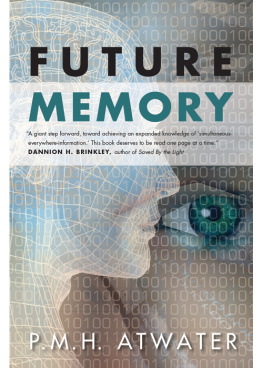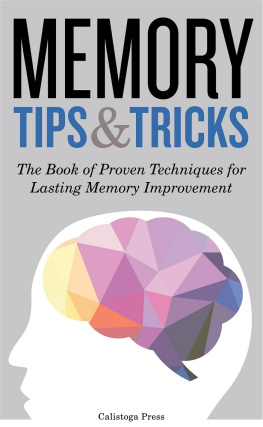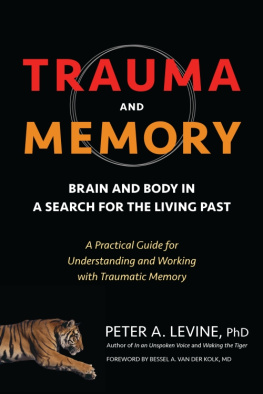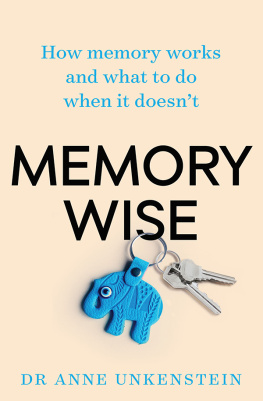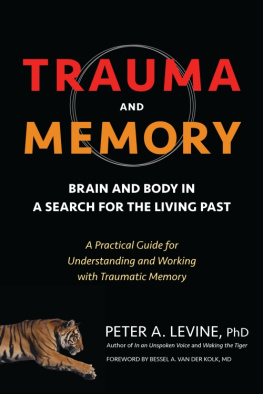Both intriguing and encyclopedic.... Schacter... brings a masterful erudition and objectivity to Searching For Memory.... Many... fascinating aspects of memory and memory research [are] woven together by Schacter into a readable narrative.
Alan Stone, American Journal of Psychiatry
Schacter has synthesized a broad overview of the ways that our brains store and, all too often, distort the past.... Schacter argues passionately for a better appreciation of both the power and the limitation of our mental records.
Scientific American
Schacter tells bizarre tales of harmed brains in the Oliver Sacks mode, stories that challenge our assumption that our minds are unitary wholes.... His many careful distinctions in the recovered-memory controversy are both valuable and sane.
John Crowley, Washington Post Book World
A broad and readable excursion through a range of memory phenomena, drawing extensively on [Schacters] own work at the interface of academic and clinical interests.
John Morton, New Scientist
An engrossing and lively account of the complex interplay of physiology and psychology that supports our memory systems.... The book dismantles many myths... a fascinating overview.
Maureen Zent, Memphis Commercial Appeal
Schacter... takes us on a journey ranging from the subtle biochemical probes used to decipher memory formation in sea slugs to the latest neu-roimaging techniques used to light up human brains.... Anyone interested in a summary of this burgeoning new field will be well rewarded.
Joseph Glenmullen, Boston Globe
Searching for Memory is a rich and engaging account of current neurosci-entific approaches to understanding human memory. The author draws on original art and everyday experience, as well as cutting-edge research, to explore a central paradox of memory: The aspects that make it fragile do not diminish its power.
Brain Work
In short, a highly readable, intellectually rich, and altogether memorable work.
Kirkus Reviews
[A] convincing and always well-argued account of the different types of memory that have recently been distinguished.... This is an excellent book on an important topic: it is exceptionally well written; its examples of defects in memory are fascinating.
Stuart Sutherland, New York Times Book Review, a Notable Book of the Year
An acute and poetic observer of human nature, Daniel Schacter has brought together a powerful and original synthesis of current work on memory, and a poignant evocation of memorys fragile power, in a book that manages to be at once weighty and delightful. Searching for Memory ponders every aspect of memory: how different forms of memory may be weakened or obliterated with disease; how, far below the level of consciousness, implicit memory allows us to perceive, speak and act; how memories are transmitted, and transformed, by culture and art; how memoriesand selvesare built through experience and continually reconstructed throughout life.
Oliver Sacks, M.D., author of An Anthropologist on Mars
Fascinating work.
Science News
In his comprehensive Searching for Memory, Daniel Schacter provides an authoritative synthesis of scientific findings (many from his own research), an evocative compilation of relevant works of art, and a convincing account of the human experience of memory.
Howard Gardner, Project Zero, Harvard University Graduate School of Education, and author of Leading Minds
If you ever have doubts about the reliability of your recollections and if you want to understand why memory can play unexpected tricks on all of us, this is the book for you. Drawing on a wealth of findings from memory research, and aided by careful scholarship and a sharp focus, Daniel Schacter convincingly undermines the myth of remembrance as the objective replica of things past. And as he does, he succeeds in illuminating the scaffolding behind the creative mental reconstructions which let us search for lost time. A notable achievement.
Antonio R. Damasio, M.D., Ph.D., M.W.Van Allen Professor of Neurology, University of Iowa, and author of Descartes Error
A full, rich picture of how human memory works, an elegant, captivating tour de force... this wonderfully enlightening survey enlarges our understanding of the minds potential.
Publishers Weekly, starred review
Dan Schacter... Thas written a compelling, readable overview of what scientists know about human memory.... This book is mandatory reading for anyone interested in psychology, biology, or simply the human lot.... Schacter has performed a difficult and commendable task, distilling a huge amount of information into a convenient format.
Mark Pendergrast, Philadelphia Inquirer
Searching for Memory
The Brain, the Mind, and the Past
DANIEL L. SCHACTER
Basic Books
A Member of the Perseus Books Group
Copyright 1996 by Daniel L. Schacter.
Published by Basic Books, A Member of the Perseus Books Group
All rights reserved. Printed in the United States of America. No part of this book may be reproduced in any manner whatsoever without written permission except in the case of brief quotations embodied in critical articles and reviews. For information, address Basic Books, 387 Park Avenue South, New York, NY 10016-8810.
Designed by Elliott Beard
Library of Congress Cataloging-in-Publication Data
Searching for memory : the brain, the mind, and the past / Daniel L. Schacter. 1st ed.
Includes bibliographical references and index.
ISBN 0-465-02502-1 (cloth)
ISBN-10: 0-465-075522-5 ISBN 0-465-07552-5 (paper)
e-book ISBN 9780465075522
1. Memory. 2. Recollection (Psychology). 3. Memory disorders. I. Title.
go371.S29 1996
153.12dc20 96-19521
As I used to say to my clients, Memory is life.
ACKNOWLEDGMENTS
T HE SEEDS OF THIS BOOK were sown in 1975, when I worked as a research assistant for Dr. Herbert Crovitz at a Veterans Administration Hospital in Durham, North Carolina. There I tested braindamaged patients who were utterly incapable of remembering new information for more than a few seconds. One man conversed easily when we first met and seemed more or less like anyone else. But when I left the room and returned several minutes later, he had totally forgotten we had ever met. Startled and intrigued by such dramatic disorders, I developed a deep and enduring interest in memory that I have pursued for the past two decades.
I have had much help along the way. Herb Crovitz ignited my interest in memory, and Endel Tulving nurtured it during my years in graduate school and ever since. I have been fortunate to work closely with many fine psychologists and neuroscientists during the past two decades. For their contributions to research described in this book, I am indebted to Marilyn Albert, Nat Alpert, Barbara Church, Lynn Cooper, Tim Curran, Elizabeth Glisky, Peter Graf, Joanne Harbluk, John Kihlstrom, Bill Milberg, Morris Moscovitch, Mary Jo Nissen, Michael Polster, Scott Rauch, Eric Reiman, Cary Savage, Endel Tulving, Anne Uecker, Mieke Verfaellie, and Paul Wangto name only some of my collaborators. I have received pointers and advice concerning phenomena and issues addressed in these pages from numerous colleagues, including Steve Ceci, Mary Harvey, Jake Jabobs, Eric Kandel, Michelle Leichtman, Elizabeth Loftus, James McGaugh, Richard McNally, Roddy Roediger, and Larry Squire. The members of the memory working group in Harvards Mind/Brain/Behavior initiativeEmory Brown, Joseph Coyle, Jordan Fieldman, Gerald Fischbach, Jerry Green, Jerome Kagan, Elaine Scarry, and Lawrence Sullivanhave helped me to think through issues addressed in this book during numerous stimulating discussions. I am especially grateful to colleagues and students who provided perceptive comments on various drafts of the entire manuscript: Laird Cermak, Tim Curran, Stephen Kosslyn, Wilma Koutstaal, Ken Norman, Kevin Ochsner, and Robin Rosenberg. For tracking down references all over the Boston area, I thank Gayle Bessenoff and Lissa Galluccio, and for keeping track of the ever-increasing bibliography, I am grateful to Mara Gross and Kim Nelson. Maura Wogan provided helpful advice concerning pragmatic aspects of this endeavor. My wife, Susan McGlynn, not only provided useful feedback on the evolving manuscript, but also put up with too many occasions when my need to write just one more page kept me from family duties. Her love and support throughout this project have helped me more than she can imagine.


